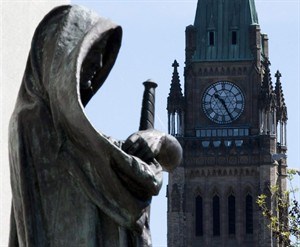
"Truth", left, the statue at the entrance of the Supreme Court of Canada in Ottawa, is shown on May 7, 2010. THE CANADIAN PRESS/Sean Kilpatrick
December 19, 2013 - 9:43 AM
TORONTO - A landmark Supreme Court ruling that could reshape Canada's sex trade comes down Friday — 34 years after the court last upheld the country's anti-prostitution laws.
The decision, which follows a partially successful challenge to the key elements of the government's ability to control prostitution, will be closely watched by sex-trade workers as well as by civil rights, women's rights and evangelical groups.
Lawyer Alan Young, who represented the three women challenging the laws, said in an interview he didn't have a good feeling about Friday's outcome but was trying to be optimistic.
"I just didn't feel when I was there that (the justices) were getting it," Young said.
"(But) there are two very lengthy and comprehensive judgments in the courts below — the lower courts did a very good job."
In March last year, Ontario's top court struck down the law against brothels, saying it exposed sex workers to added danger by forcing them onto the streets.
The 132-page decision also modified a second law against living on the avails of the sex trade to specifically preclude exploitation.
The federal and Ontario governments appealed those two parts of the decision, arguing among other things that Ottawa was justified in the way it dealt with a "complex social problem."
At the same time, the court upheld a third element: the ban on soliciting for the purposes of prostitution, prompting the women who launched the challenge to cross-appeal that ruling.
The Ontario court decisions were put on hold pending the ruling from the Supreme Court of Canada, which heard oral arguments in June.
One of the women involved in the case, former prostitute Valerie Scott, of Toronto, said she feared a backlash from those implacably opposed to any prostitution — which is legal in Canada — if the laws do get struck down.
"They were angry at Appeal Court," Scott said.
"If we win at the Supreme Court of Canada, they're going to be even angrier."
In its decision, Ontario's Appeal Court made it clear it wasn't passing moral judgment on the sex trade, only whether the laws were constitutional.
"Prostitution is a controversial topic, one that provokes heated and heartfelt debate about morality, equality, personal autonomy and safety," the ruling stated.
"It is not the court's role to engage in that debate."
In a reference case decided in 1990, the Supreme Court upheld the ban on street solicitation in a decision that saw the two women justices dissenting.
The majority held that an infringement on communication rights was justified given the government wanted to abolish prostitution, which the justices decided was a valid goal.
Sex-trade workers argued much has changed since then, including Robert Pickton's horrific serial killings of prostitutes in British Columbia.
Retired dominatrix Terri-Jean Bedford and Vancouver sex worker Amy Lebovitch are the other two women involved in the case.
News from © The Canadian Press, 2013